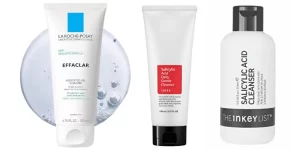
If you’re like me, you love finding affordable and effective skincare products that work wonders for your skin.
And if you’re also like me, you’ve probably heard of Cerave and Cetaphil, two of the most popular drugstore skincare brands ever.
But which one is better for your skin? How do you choose between them?
That’s where I come in.
In this post, I’m going to compare and contrast Cerave vs Cetaphil in terms of their ingredients, formulas, features, and target audiences.
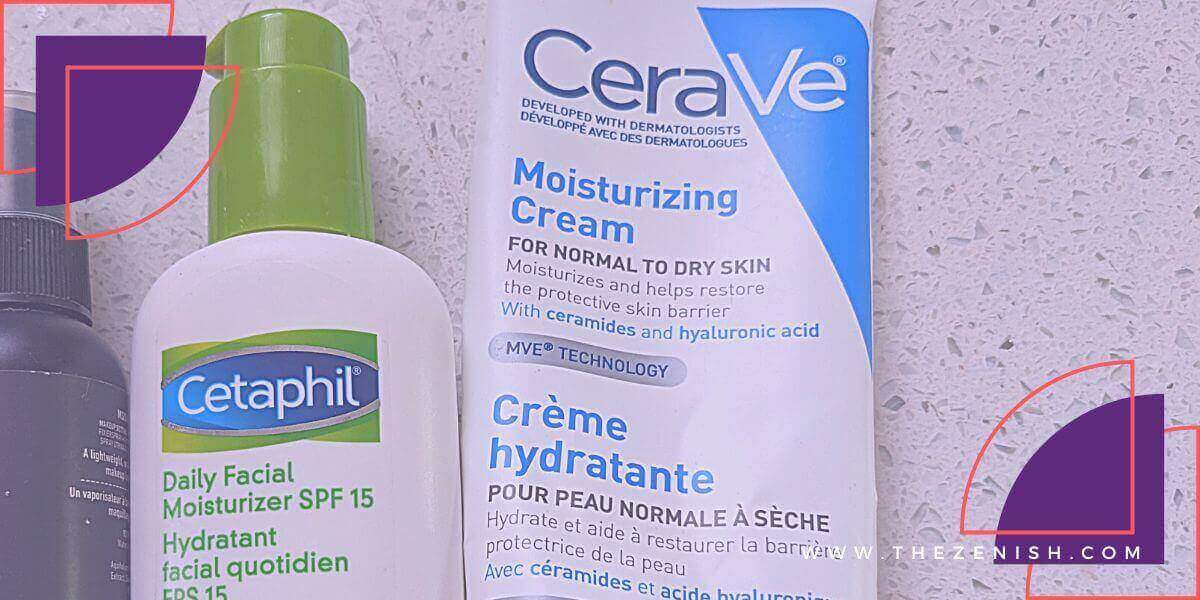
I’m also going to share with you some of their best products for different categories, like cleansers, moisturizers, sunscreens, etc.
| this post may contain affiliate links, which means if you purchase from one of these links, I may receive a small commission at no additional cost to you. |
By the end of this post, you’ll know exactly which brand is best for your skin type and concerns, and how to use their products to achieve clear and glowing skin.
Cerave
Before we dive into the comparison, let’s talk about what makes Cerave so special and unique.
Cerave (developed by dermatologists) has a patented formula that delivers amazing benefits for your skin.
Here are some of the features that make Cerave stand out from other skincare brands:
A blend of three essential ceramides
Cerave contains a blend of three essential ceramides (lipids that are naturally found in your skin and help to keep it healthy and hydrated) that protect the skin barrier function and lock in moisture.
As you age, your ceramide levels decrease, which can lead to dryness, dullness, and wrinkles.
Cerave replenishes your ceramide levels and helps to restore your skin’s natural barrier.
Patented Multivesicular Emulsion (MVE)
Cerave also has a patented Multivesicular Emulsion (MVE) technology that releases moisture gradually throughout the day for better hydration.
This means that Cerave products don’t just moisturize your skin once, but they keep it moisturized for up to 24 hours.
This is great if you have dry skin and want to prevent moisture loss and dehydration.
Hyaluronic acid and niacinamide
Cerave also uses quality ingredients like the amazing hyaluronic acid (a humectant that attracts and retains water in your skin, making it plump and smooth) and niacinamide (a vitamin B3 derivative that helps to reduce inflammation, redness, pore size, and hyperpigmentation) that have multiple benefits for the skin.
These two ingredients work together to improve your skin’s texture, tone, and appearance.
As you can see, Cerave has some amazing features that make it a great choice for anyone who wants to take good care of their skin.
Cerave products are also fragrance-free, non-comedogenic, and hypoallergenic, which means they won’t irritate your skin or cause breakouts.
Cerave also has products for all skin types and concerns, such as acne, eczema, rosacea, anti-aging, etc.
Cetaphil
After exploring the benefits of Cerave, let’s shift our focus to what makes Cetaphil stand out.
Cetaphil is renowned for its gentle and non-irritating formulas, making it perfect for sensitive skin or skin conditions like eczema and psoriasis and even for tattoos.
Here are some of the features that make Cetaphil stand out from other skincare brands:
PH-balanced formulations
Cetaphil offers pH-balanced formulations that help maintain the optimal acidity level for healthy skin.
The pH level of your skin is crucial as it influences your skin’s ability to combat bacteria, fungi, and other pathogens that can lead to infections and inflammation.
When your skin’s pH level is either too high or too low, it can disrupt the skin’s barrier function, making it more susceptible to dryness, irritation, and breakouts.
Cetaphil products can help balance your skin’s pH level and maintain the ideal range of 4.5 to 5.5.
Non-greasy and quick-absorbing
Cetaphil also has non-greasy and quick-absorbing formulas that provide long-lasting hydration and form a protective layer on the skin.
This means that Cetaphil products don’t leave a sticky or oily residue on your skin, but they still moisturize it effectively and prevent transepidermal water loss.
This is great news for oily skin types or anyone who wants to avoid a shiny or greasy look.
Simple and gentle ingredients
Cetaphil uses simple and gentle ingredients that are both safe and effective for all skin types.
Their products don’t contain any harsh chemicals, fragrances, dyes, or alcohol that can irritate your skin or cause allergic reactions.
Cetaphil products are also non-comedogenic, which means they won’t clog your pores or cause acne.
Cetaphil has some amazing features that make it a great choice for anyone with sensitive skin or skin conditions that require extra care.
Its products are affordable, accessible, and reliable, which means you can easily find them at your local drugstore or online.
Cetaphil offers products for all skin types and concerns, including dry, oily, combination, and normal skin.
Let’s explore some of their most popular products and compare them to Cerave’s best sellers.
Cerave vs Cetaphil: best-selling products
You’ve learned about the features of Cerave and Cetaphil, but how do the products stack up against each other?
Let’s find out by comparing some of their best-selling products for different categories.
We’ll look at their cleansers, moisturizers, sunscreens, and more.
I’ll also tell you the pros and cons of each product and how they can work for different skin types and concerns.
Cerave vs Cetaphil: cleansers
Cleansers are the first step in any skincare routine as they help to remove dirt, oil, makeup, and impurities from your skin.
They also prepare your skin for the rest of your skincare products.
Fortunately, both CeraVe and Cetaphil offer gentle and effective cleansers that cater to different skin types and needs.
Here are their best-selling products:
Cerave Hydrating Facial Cleanser
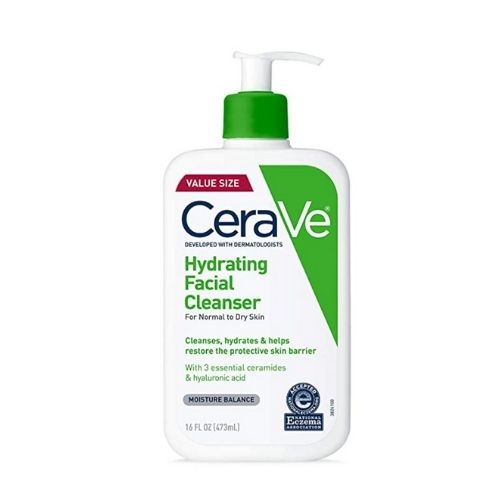
This cleanser is ideal if you have dry or normal skin.
Its creamy texture feels like a hug for your skin and won’t lather or strip away your skin’s natural oils.
With added ceramides, hyaluronic acid, and glycerin, it effectively hydrates and nourishes your skin.
It also has a pH level of 5.5, which is close to your skin’s natural pH level.
Pros:
- Hydrates and nourishes your skin
- Doesn’t lather or strip your skin
- Maintains your skin’s pH balance
- Fragrance-free and non-comedogenic
Cons:
- Doesn’t remove heavy makeup or sunscreen well
- Not the best if your skin is oily or prone to breakouts
Cetaphil Gentle Skin Cleanser
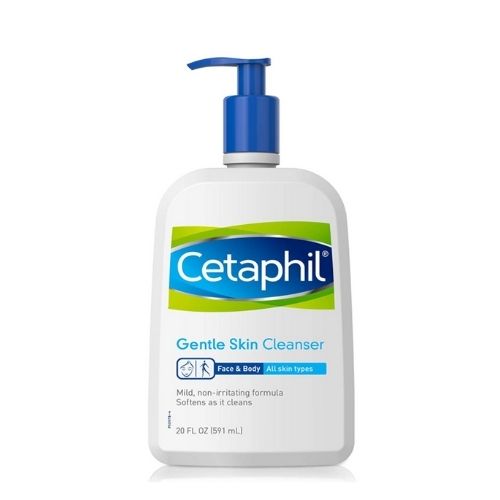
This cleanser is ideal for sensitive or normal skin types.
Its lotion-like texture gently cleanses the skin without causing any irritation.
The cleanser contains cetyl alcohol, stearyl alcohol, propylene glycol, and sodium lauryl sulfate, which work together to emulsify and remove dirt and oil from the skin.
It also has a pH level of 6.3 to 6.8, which is slightly higher than your skin’s natural pH level.
Pros:
- Gently cleanses your skin without irritating it
- Removes dirt and oil from your skin
- Suitable for sensitive skin
- Fragrance-free and non-comedogenic
Cons:
- May not hydrate or nourish your skin well
- May disrupt your skin’s pH balance
- Contains sodium lauryl sulfate, which can be drying or sensitizing for some people
Cerave vs Cetaphil: moisturizers
Moisturizers play a crucial role in keeping your skin hydrated, soft, and smooth, while also protecting it from environmental factors and preventing moisture loss.
Both Cerave and Cetaphil offer a range of moisturizing products that cater to different skin types and needs. Like the
Cerave Moisturizing Cream
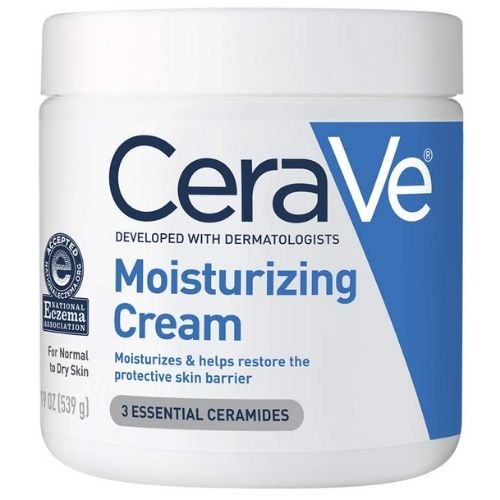
This moisturizer is perfect if you have dry or very dry skin. Its rich and creamy texture quickly absorbs into the skin.
The formula includes ceramides, hyaluronic acid, cholesterol, petrolatum, and dimethicone to effectively hydrate and repair the skin barrier.
It also has MVE technology to deliver moisture throughout the day.
Pros:
- Hydrates and repairs your skin barrier
- Sinks into your skin quickly
- Provides long-lasting moisture
- Fragrance-free and non-comedogenic
Cons:
- May feel too heavy or greasy for some people
- May not be suitable for oily or acne-prone skin
Cetaphil Moisturizing Lotion
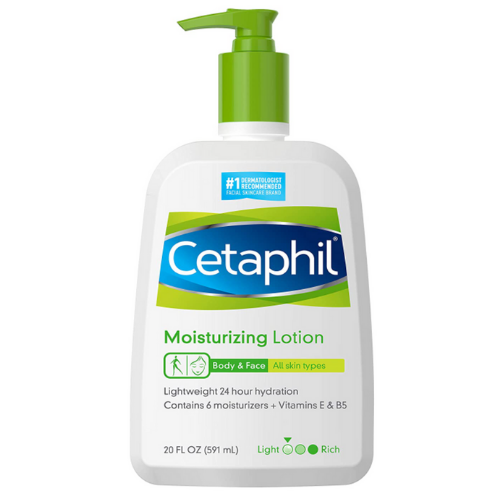
This moisturizer is perfect if your skin is dry.
Its lightweight, non-greasy texture glides on easily and contains glycerin, macadamia nut oil, vitamin E, panthenol, and dimethicone to hydrate and soothe your skin.
It also forms a protective layer on your skin to prevent moisture loss.
Pros:
- Hydrates and soothes your skin
- Lightweight and non-greasy texture
- Forms a protective layer on your skin
- Fragrance-free and non-comedogenic
Cons:
- May not hydrate or repair your skin barrier well
- May contain allergens or irritants
Cerave vs Cetaphil sunscreen
Sunscreen is a must-have for your skin, not only to prevent sunburns, but also to protect it from the damaging effects of UV rays, such as wrinkles, sagging, and skin cancer. But not all sunscreens are created equal, and you need to find one that suits your skin type and needs.
Cerave and Cetaphil both have a range of sunscreens that cater to different skin concerns and preferences. Let’s take a look at what they offer and how they compare.
Cerave
Cerave sunscreen products are famous for their unique formula that contains essential ceramides, that help restore and maintain the skin’s natural barrier. This means that Cerave sunscreens not only shield your skin from UV rays but also moisturize and strengthen it.
They are also formulated with hyaluronic acid, which helps retain moisture in the skin, and niacinamide, which helps reduce inflammation and redness. Cerave sunscreens are ideal if you have dry or sensitive skin, or want to improve your skin’s texture and appearance.
Cerave AM Facial Moisturizing Lotion SPF 30
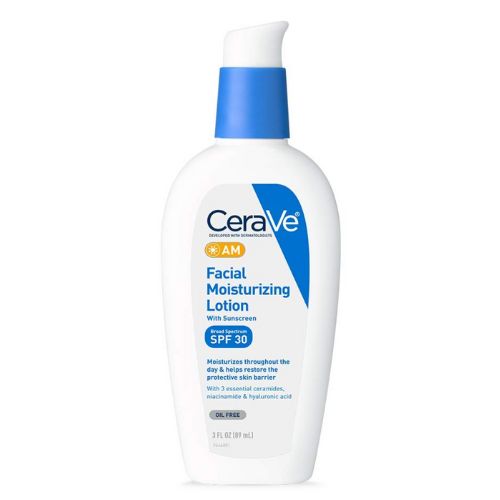
This sunscreen is ideal for normal to dry skin types, as it has a lightweight and non-greasy texture that both moisturizes and protects the skin.
It contains ceramides, hyaluronic acid, niacinamide, and zinc oxide, which work together to hydrate, brighten, and shield the skin from the sun’s harmful rays.
They say it has a matte finish that doesn’t leave a white cast on your skin, but personally, I find that it does leave a white cast, especially if you have darker skin so keep that in mind.
Pros:
- Hydrates, brightens, and shields your skin
- Lightweight and non-greasy texture
- Matte finish that doesn’t leave a white cast (unless you have darker skin)
- Fragrance-free and non-comedogenic
Cons:
- May pill or flake under makeup
- Might be too thick for oily, acne-prone skin
Cetaphil sunscreen products are known for their lightweight and non-greasy formulas, which make them perfect for people with oily or acne-prone skin. Cetaphil sunscreens are also oil-free, fragrance-free, and hypoallergenic, which means they won’t clog your pores or irritate your skin. Cetaphil sunscreens are designed to be gentle on your skin, while providing effective sun protection. Cetaphil sunscreens are great for people who want a simple and fuss-free sunscreen that won’t leave a white cast or a shiny finish.
Cetaphil Daily Facial Moisturizer SPF 15
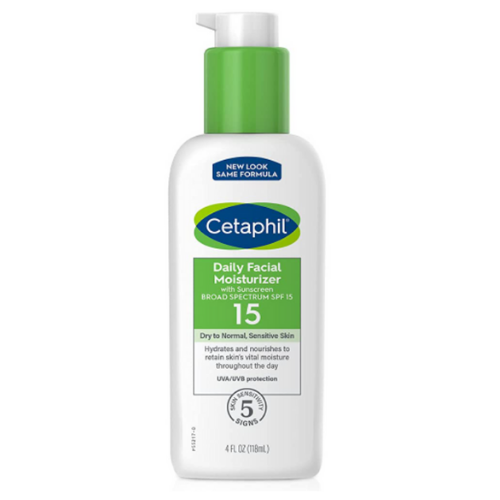
This sunscreen is ideal for normal to oily skin types, as it features a lightweight and oil-free texture that both hydrates and protects your skin.
It contains glycerin, avocado oil, vitamin E, octinoxate, and octisalate, providing moisture, nourishment, and defense against the sun’s harmful rays.
It also has a sheer finish that doesn’t leave a white cast on your skin (this is true even for darker skin tones).
Pros:
- Hydrates, nourishes, and defends your skin
- Lightweight and oil-free texture
- Sheer finish that doesn’t leave a white cast
- Fragrance-free and non-comedogenic
Cons:
- May not provide enough sun protection
- May contain allergens or irritants
FAQ
Cerave vs Cetaphil: which brand is better for dry skin?
Cerave is generally better for dry skin than Cetaphil.
Cerave products contain ceramides, hyaluronic acid, and other moisturizing ingredients that help to hydrate and repair the skin barrier.
Cerave also has MVE technology that delivers moisture throughout the day.
Cetaphil products aren’t as hydrating or nourishing as Cerave products.
CeraVe vs Cetaphil: which brand is better for sensitive skin?
Cetaphil is generally better for sensitive skin than Cerave.
Cetaphil products are gentle and non-irritating and are recommended by dermatologists for skin conditions like eczema and rosacea.
Cetaphil products also have pH-balanced formulations that maintain the optimal level of acidity for healthy skin.
Cerave products may contain ingredients that can be sensitizing or allergenic for some people, such as niacinamide or sodium lauryl sulfate.
Cerave vs Cetaphil: which brand is better for acne-prone skin?
Both brands can work well for acne-prone skin, depending on the product and the ingredients.
Both brands offer non-comedogenic products that won’t clog pores or cause breakouts.
However, some ingredients may be more beneficial or problematic for acne-prone skin than others.
For instance, niacinamide can help to reduce inflammation, redness, pore size, and hyperpigmentation, but it can also cause irritation or flushing for some people.
Sodium lauryl sulfate can help to remove dirt and oil from the skin, but it can also be drying or sensitizing for some people.
It’s best to check the ingredient list and patch-test any product before using it on your face.
How do I use Cerave and Cetaphil products?
You can use Cerave and Cetaphil products as part of your daily skincare routine.
The basic steps are:
- Cleanse your face with a gentle cleanser, such as Cerave Hydrating Facial Cleanser or Cetaphil Gentle Skin Cleanser. Rinse well with lukewarm water and pat dry with a soft towel.
- Apply a moisturizer with SPF in the morning, such as Cerave AM Facial Moisturizing Lotion SPF 30 or Cetaphil Daily Facial Moisturizer SPF 15. Massage gently into your face and neck until absorbed.
- Apply a moisturizer without SPF in the evening, such as Cerave Moisturizing Cream or Cetaphil Moisturizing Lotion. Massage gently into your face and neck until absorbed.
- You can also use other products as needed, such as eye creams, serums, masks, or spot treatments. Follow the directions on the product label and use them after cleansing and before moisturizing.
Where can I buy Cerave and Cetaphil products?
You can buy Cerave and Cetaphil products at most drugstores, supermarkets, online retailers, or directly from their websites.
The prices may vary depending on the product, the size, and the retailer.
Generally speaking, both brands are affordable and accessible.


